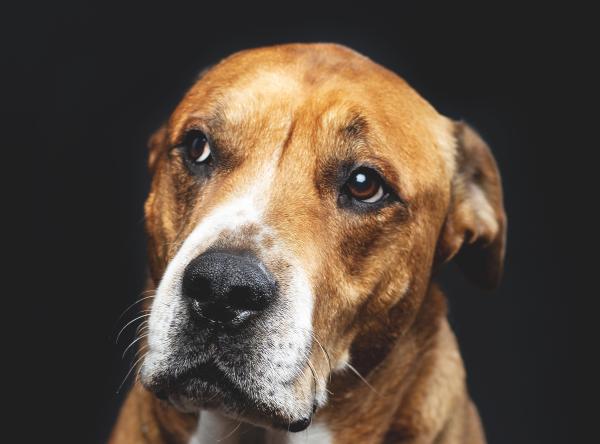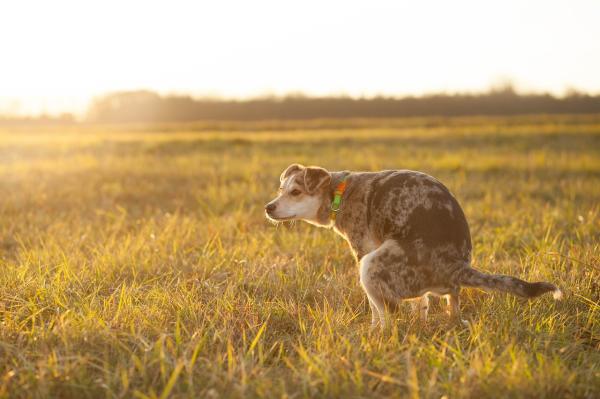
Finding blood in your dog's feces can be shocking. Although they may appear otherwise healthy, it implies a serious internal condition which rightly causes fear in the caregiver. The causes of blood in a dog's stool are varied. It can range from a mild rectal issue to a life-threatening disease such as canine parvovirus. If you’re dog is experiencing bloody diarrhea or has any blood in their stool, we advise consulting your veterinarian to determine the cause. Doing so best ensures the health of your dog as it may be an issue which requires immediate treatment.
If you have noticed blood in your dog's feces or your dog has diarrhea with blood, this AnimalWised article will help you understand the possible causes and treatment of blood in a dog's stool.
The color of your dog’s bloody stool
There are two types of blood in in a dog’s stool: hematochezia and melena. They can be distinguished by the color of the blood in your dog’s poop. The color is determined by the part of the gastrointestinal tract where the blood originates. It is important to recognize the difference between these two types of bloody feces stool blood because they will determine the diagnosis of your dog’s condition:
- Hematochezia: the presence of fresh blood in a dog’s feces. The blood in the stool will have a vivid red color. In this case, the blood has not been digested and originates comes from a dog’s lower digestive system, specifically the colon or rectum. This blood may be mixed with feces or you may notice drops of blood drip when your dog defecates.
- Melena: the presence of digested blood in your dog’s feces. The blood then has a blackish color, is malodorous and has a generally tar-like appearance. This blood has been digested and comes from the upper portions of a dog’s digestive system. Melena is harder to notice than hematochezia. This is because a dog’s feces is generally dark, making the dark blood in the feces less visible. If in doubt, place your dog's feces on white absorbent household paper, if a reddish color diffuses on the paper it is very likely that your dog has melena.
As you can see the further up the gastrointestinal tract, the darker the blood in a dog's stool will be. This is similar to when the dog urinates a little blood as it will change the coloration of the urine differently.
Causes of hematochezia in dogs
Contrary to what happens in humans, hematochezia is not indicative of hemorrhoids in dogs. If your dog has hematochezia, we suggest consulting a veterinarian as soon as possible. The underlying issue or cause of this type of blood in feces could be serious. The causes of fresh blood in dog stool (bright red blood) can vary. Here are some possible causes of dog feces with blood:
- Parasites: parasites are one of the most frequent causes of fresh blood in dog stool. The most common parasites are hookworms, Trichocephalus and nematodes. Additionally, protozoa, such as Coccidia, can also cause hematochezia. Your vet will test your dog's feces and determine which parasite is present. Once a veterinarian knows the cause behind your dog pooping blood, they can treat the condition accordingly.
- Parvovirus: parvovirus is a serious disease that mainly affects puppies. Rottweilers, German Shepherds and Dobermans are the dog breeds most prone to suffering from canine parvovirus. A puppy affected by parvovirus will experience dog diarrhea with blood and vomiting, lethargy, loss of appetite and fresh blood in the stool. Parvovirus can be fatal, especially in immunocompromised dogs such as young puppies. This is why it is advisable that you consult your veterinarian immediately if you suspect parvovirus.
- Diet: some dogs have a tendency to overeat. Overeating can cause irritation in your dog's colon, diarrhea and the presence of fresh blood in their feces, which in this case also contains mucus[1]. Inappropriately modifying in your dog's diet can have similar effects. If you are going to change your dog's food, we suggest applying this change progressively over a period of several days. If a change in diet is too sudden, it can cause vomiting and diarrhea in dogs.
- Allergies or digestive problems: some dogs have sensitive stomachs. Even a a new treat can cause bloody diarrhea in certain circumstances. This blood is usually caused by inflammation in the colon from sensitivity. Food intolerances and allergies can also cause fresh blood in feces. If you believe your dog may be suffering from an allergy or intolerance, we suggesting reading about dog food allergies and intolerance.
- Hemorrhagic gastroenteritis: the origin of this infection is difficult to determine. Hemorrhagic gastroenteritis can cause bloody vomiting and/or diarrhea in dogs. If your dog is suffering from hemorrhagic gastroenteritis, they may need fluid therapy and appropriate medication.
- Rectal wounds: if your dog has recently eaten a sharp object, such as a stick or bone, it can perforate the intestinal wall of the dog’s lower digestive system. If this is the case, you will often be able to see this object in your dog’s feces. Another cause of fresh blood in dog stool is rectal polyps. Rectal polyps are defined as abnormal growths. A veterinarian will diagnose this through rectal palpation or by endoscopy. These polyps can sometimes be carcinogenic and should be treated accordingly by a veterinarian.
- Stress: in some cases, a stressful event can cause hematochezia to your dog. Events that cause stress in your dog include include a recent move, elongated stay in a dog shelter, the arrival of a new dog in the house or the arrival of a new human family member in a home. If you want to find out whether or not your dog may be stressed, take a look at our article on signs your dog is stressed.

Causes of melena in dogs
Dark blood is commonly known as melena in dogs and can prove to be quite serious. Melena may originate from a dog’s lungs, pharynx, esophagus, stomach or small intestine. If you believe your dog is suffering from something which causes melena, we suggest consulting your veterinarian immediately. Here are some possible causes of melena in dogs:
- Use of NSAIDS: NSAIDs or non-steroidal anti-inflammatory drugs such as aspirin can cause ulcers in dogs. A dog with bleeding ulcers in their digestive tract will experience black tar-like feces when they poop. This is because it is digested blood that comes from the stomach or upper GI tract. If your dog is pooping dark blood, consult your vet immediately.
- Blood clotting disorders: there are several canine diseases which can cause clotting disorders in dogs. This blood clotting consequently causes bleeding and black blood in the stool. Rat poison can cause clotting problems and black blood in feces. If you think your dog has accidentally ingested any poison, consider this an emergency and take them to your nearest vet immediately.
- Complications after surgery: if your dog has recently had a surgical operation and you notice they are pooping blood, call your veterinarian immediately. This complication can occur up to 72 hours after surgery.
- Tumors: if your dog has black blood in their stool, your vet will have to perform tests to rule out the possibility of bleeding tumors, such as polyps or cancer. These causes are more common in geriatric dogs (elderly dogs).
- Using Pepto Bismol: we discourage the use of Pepto Bismol in dogs. As with any medication, you should always consult your doctor before giving to your dog, specifically if it is human medication. Pepto Bismol can cause a dog’s feces to turn black, but this is not blood. If you notice this, stop giving your dog this medication and the color of your dog’s stool should revert back to normal.
- Blood ingestion: your dog may have licked a bleeding wound or swallowed blood from their nose or mouth which can then cause the presence of digested blood in feces.
- Other causes of bloody stool in dogs: bowel obstructions, fissures, trauma, bacterial infection by Campylobacter or Clostridium can also cause blood in the stool.
Mucus and blood in dog stool
It is possible you will see blood with mucus in your dog's stool. The treatment of the dog that presents blood in feces will vary depending on the cause, so you will need to help achieve the right diagnosis. That is why it is essential to go to a veterinarian to obtain a reliable diagnosis of your dog’s bleeding. Remember that self-medicating a dog can be detrimental to its health.
Many of the causes listed above will also result in mucus in the dog's feces, especially infections and parasites. During administration of a specific treatment, your vet will probably suggest feeding your dog soft diet based on rice and chicken. A dog's symptoms should be treated and medicated accordingly.
More serious problems, such as cancer, should be detected and treated as soon as possible. For more, take a look at causes of why is my dog bleeding from the anus.

Treatment of blood in a dog's feces
Treatment of blood in dog's stool is dependent on the underlying cause. As you can see from the causes of hematochezia and melena in dogs, the problems vary greatly in severity. While we may be scared for our dog's wellbeing when we see blood in their feces, we will only know their prognosis by going to a veterinarian. They will be able to achieve a differential diagnosis and administer the correct treatment.
- Parasites: antiparasitic drugs will be used to kill the parasites and deworming schedules implement to prevent future infestation.
- Diet and allergies: dietary changes will need to be made and any allergens removed from both their food and their environment.
- Infections: antibiotic treatments will be required for bacterial infections. Viral infections will require symptom management to help prevent more bleeding and to strengthen the dog's immune system.
- Stop medication: if any medication has bloody feces as a side effect, it will need to be stopped and replaced with something more suitable.
- Stress: removal of stressors from the dog's environment and general supportive treatment.
- Cancer: if treatment if available, it will involve some combination of surgery, radiotherapy and chemotherapy for dogs.
Whatever the cause, it will be your veterinarian will be the one to determine the treatment. Never use home remedies for blood in a dog's stool. You may worsen the situation or simply not treat the reason for the bleeding.

This article is purely informative. AnimalWised does not have the authority to prescribe any veterinary treatment or create a diagnosis. We invite you to take your pet to the veterinarian if they are suffering from any condition or pain.
If you want to read similar articles to Blood in Dog Feces - Causes and Treatment, we recommend you visit our Intestinal problems category.
1. Brambillasca, S., Purtscher, F., Britos, A., Repetto, J. L., & Cajarville, C. (2010). Digestibility, fecal characteristics, and plasma glucose and urea in dogs fed a commercial dog food once or three times daily. The Canadian veterinary journal = La revue veterinaire canadienne, 51(2), 190–194.
https://www.ncbi.nlm.nih.gov/pmc/articles/PMC2808285/